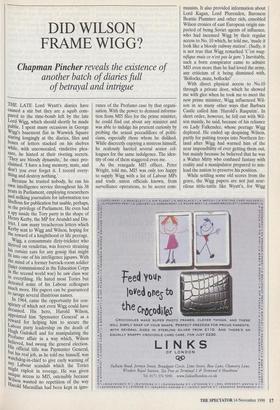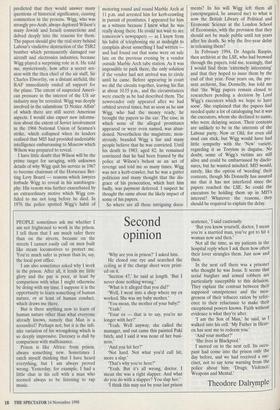DID WILSON FRAME WIGG?
THE LATE Lord Wyatt's diaries have caused a stir but they are a squib com- pared to the time-bomb left by the late Lord Wigg, which should shortly be made public. I spent many occasions in George Wigg's basement flat in Warwick Square staring longingly at the diaries, files and boxes of letters stacked on his shelves while, with unconcealed, vindictive plea- sure, he hinted at their riveting secrets. They are bloody dynamite,' he once pro- claimed. have a long memory, mate, and don't you ever forget it. I record every- thing and destroy nothing.' Because he trusted nobody, he ran his Own intelligence service throughout his 38 Years in Parliament, employing researchers and milking journalists for information too libellous for publication but usable, perhaps, in the privilege of Parliament. He even had a spy inside the Tory party in the shape of Henry Kerby, the MP for Arundel and Dis- trict. I saw many treacherous letters which Kerby sent to Wigg and Wilson, hoping for the reward of a knighthood or life peerage. Wigg, a consummate dirty-trickster who thrived on vendettas, was forever straining his outsize ears for any gossip that might fit into one of his intelligence jigsaws. With the mind of a former barrack-room soldier (later commissioned in the Education Corps M. the second world war) he saw class war M everything. He hated most Tories but detested some of his Labour colleagues Much more. His papers can be guaranteed to savage several illustrious names. In 1964, came the opportunity for con- spiracy of which not even Wigg could have dreamed. His hero, Harold Wilson, aPpointed him `Spymaster General' as a reward for helping him to secure the Labour party leadership on the death of Hugh Gaitskell and for manipulating the frnfomo affair in a way which, Wilson believed, had swung the general election. Ills official title was Paymaster General, but his real job, as he told me himself, was Watchdog-in-chief to give early warning of any Labour scandals which the Tories aught exploit in revenge. He was given Wilson access to MI5, ostensibly because wanted no repetition of the way Harold Macmillan had been kept in igno- rance of the Profumo case by that organi- sation. With the power to demand informa- tion from MI5 files for the prime minister, he could find out about any minister and was able to indulge his prurient curiosity by probing the sexual peccadilloes of politi- cians, especially those whom he disliked. While discreetly enjoying a mistress himself, he zealously harried several senior col- leagues for the same indulgence. The iden- tity of one of them staggered even me.
As the renegade MI5 officer, Peter Wright, told me, MI5 was only too happy to supply Wigg with a list of Labour MPs and trade union officials known, from surveillance operations, to be secret com- munists. It also provided information about Lord Kagan, Lord Plurenden, Baroness Beattie Plummer and other rich, ennobled Wilson cronies of east European origin sus- pected of being Soviet agents of influence, who had incensed Wigg by their regular access to No. 10 which, he told me, 'made it look like a bloody railway station'. (Sadly, it is not true that Wigg remarked 'C'est mag- nifique mars ce n'est pas la gare.') Inevitably, such a born conspirator came to admire MI5 even more than he had loved the army, any criticism of it being dismissed with, `Bollocks, mate, bollocks!'
With direct physical access to No.10 through a private door, which he showed me with glee when he took me to meet the new prime minister, Wigg influenced Wil- son in so many other ways that Barbara Castle called him 'Harold's Rasputin'. In short order, however, he fell out with Wil- son mainly, he said, because of his reliance on Lady Falkender, whose peerage Wigg deplored. He ended up despising Wilson, partly for putting troops into Northern Ire- land after Wigg had warned him of the near impossibility of ever getting them out, but mainly because he believed that he was a Walter Mitty who confused fantasy with reality and a manipulator prepared to mis- lead the nation to preserve his position.
While settling some old scores from the grave, the Wigg papers are not just scur- rilous tittle-tattle like Wyatt's, for Wigg predicted that they would answer many questions of historical significance, causing commotion in the process. Wigg, who was strongly pro-Arab, always deplored Wilson's many Jewish and Israeli connections and delved deeply into the reasons for them. The papers should give the real story behind Labour's vindictive destruction of the TSR2 bomber which permanently damaged our aircraft and electronics industries, because Wigg played a surprising role in it. He told me, mysteriously, how after a secret ses- sion with the then chief of the air staff, Sir Charles Elworthy, on a distant airfield, the RAF immediately ended all support for the plane. The extent of suspected Ameri- can pressure in the interest of the US air industry may be revealed. Wigg was deeply involved in the calamitous 'D Notice Affair' of which there are still secret American aspects. I would also expect new informa- tion about the extent of Soviet involvement in the 1966 National Union of Seamen's strike, which collapsed when its leaders realised that MI5 had provided undeniable intelligence embarrassing to Moscow which Wilson was prepared to reveal.
I have little doubt that Wilson will be the prime target for savaging, with unknown details of why Wigg quit his service in 1967 to become chairman of the Horserace Bet- ting Levy Board — reasons which lawyers forbade Wigg to reveal in his autobiogra- phy. His venom was further exacerbated by an extraordinary motive which Wigg con- fided to me not long before he died. In 1976 the police spotted Wigg's habit of motoring round and round Marble Arch at 11 p.m. and arrested him for kerb-crawling in pursuit of prostitutes. I appeared for him as a witness because I knew what he was really doing there. He could not wait to see tomorrow's newspapers — as I knew from his habit of telephoning me at midnight to complain about something I had written and had found out that some were on sale late on the previous evening by a vendor outside Marble Arch tube station. As it was impossible to park there, the only solution if the vendor had not arrived was to circle until he came. Before appearing in court we did the circuits together, leaving his flat at about 10.55 p.m., and the circumstances were exactly as he had described them. The newsvendor only appeared after we had orbited several times, but as soon as he saw Wigg, who had the money ready, he brought the papers to the car. The case, in which none of the alleged prostitutes appeared or were even named, was aban- doned. Nevertheless the magistrate, mon- strously, branded Wigg a liar and many people believe that he was convicted. Until his death in 1983, aged 82, he remained convinced that he had been framed by the police at Wilson's behest as an act of revenge and told me so many times. Wigg was not a kerb-crawler, but he was a gutter politician and many thought that the dis- grace of his prosecution, which hurt him badly, was payment deferred. I suspect he thought the same about the likely impact of some of his papers.
So where are all these intriguing docu- ments? In his will Wigg left them all (unexpurgated, he assured me) to what is now the British Library of Political and Economic Science at the London School of Economics, with the provision that they should not be made public until ten years after his death. So why the five-year delay in releasing them?
In February 1994, Dr Angela Raspin, then archivist at the LSE, who had browsed through the papers, told me, teasingly, that I would find them 'extremely interesting' and that they hoped to issue them by the end of that year. Four years on, the pre- sent archivist, Sue Donnelly, has told me that 'the Wigg papers remain closed to researchers pending a decision by Lord Wigg's executors which we hope to have soon'. She explained that the papers had needed quite a lot of cataloguing but it was the executors, whom she declined to name, who were delaying access. Their contents are unlikely to be in the interests of the Labour party, New or Old, for even old mud can stick, but Wigg would have had little sympathy with the 'New' variety, regarding it as Toryism in disguise. No doubt, some of Wigg's victims are still alive and could be embarrassed by disclo- sures, but he wanted mischief. MI5 would, surely, like the option of 'weeding' their contents, though Ms Donnelly has assured me that it has not interfered since the papers reached the LSE. So could the executors be holding them up in MI5's interest? Whatever the reasons, they should be required to explain the delay.



















































































 Previous page
Previous page